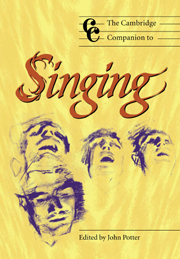Book contents
- Frontmatter
- 1 Introduction: singing at the turn of the century
- Part I Popular traditions
- Part II The voice in the theatre
- 6 Stage and screen entertainers in the twentieth century
- 7 Song into theatre: the beginnings of opera
- 8 Grand opera: nineteenth-century revolution and twentieth-century tradition
- Part III Choral music and song
- Part IV Performance practices
- Notes
- Select bibliography
- Index
7 - Song into theatre: the beginnings of opera
from Part II - The voice in the theatre
Published online by Cambridge University Press: 28 September 2011
- Frontmatter
- 1 Introduction: singing at the turn of the century
- Part I Popular traditions
- Part II The voice in the theatre
- 6 Stage and screen entertainers in the twentieth century
- 7 Song into theatre: the beginnings of opera
- 8 Grand opera: nineteenth-century revolution and twentieth-century tradition
- Part III Choral music and song
- Part IV Performance practices
- Notes
- Select bibliography
- Index
Summary
And their singing! Good Lord! Let me never hear a Frenchwoman singing Italian arias. I can forgive her if she screeches out her French trash, but not if she ruins good music! It's simply unbearable.
So Mozart wrote from Paris in 1778. A few years earlier, the British musicologist Charles Burney heard the soprano and high tenor in the main Paris concert series ‘screaming’ and ‘bellowing’. At the Académie Royale de Musique, the home of serious opera, things were little better: voices ‘in themselves really good and well toned’ but, in their expression, ‘detestable and unnatural’. At the other main house, the Opéra-Comique, ‘bravura songs’ were ‘so ill performed that no one used to true Italian singing can like anything but the words and action’. It was ‘hardly too much to say, [good singing] is never to be heard at the theatres’.
Mozart and Burney were among many who, into the early nineteenth century, dismissed French opera singing out of hand because it was unlike Italian. By the 1770s the two operatic traditions had been established for over a century; between them they dominated Europe. The Italian tradition ruled from Lisbon to St Petersburg by way of London and Berlin; it was the way to sing in the theatre, just as Italian opera was the opera and Italian or Italian-trained singers appeared on stage everywhere – but not in France. There, occasional visits by Italian companies – from the 1640s to the 1750s – set off debate; their methods found champions, yet every time the French public went back to its own composers and singers and to their performing style, however ‘detestable’ to outsiders. Though the tradition must have pleased the bulk of the home audience, in Europe it was isolated.
- Type
- Chapter
- Information
- The Cambridge Companion to Singing , pp. 83 - 95Publisher: Cambridge University PressPrint publication year: 2000
- 4
- Cited by

